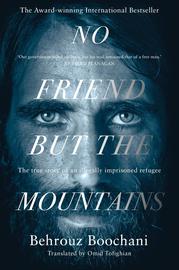These days my appetite for books has developed into a raging hunger. I’m devouring everything from online essays to old friends in my library. In passing, let me recommend Albert Camus’ The Plague, which has so much to say to us right now about humans, power and epidemics.
Obviously, isolation is much on my mind these days. On that note, I’m going to introduce you to a couple of works on the subject starting with a remarkable e-book, No Friend but the Mountains; Writings from Manus Prison by Behrouz Boochani.
Boochani had many collaborators and I’m proud to say I was one of them. He sent it, fragment by fragment, to a group of friends, translators and editors on WhatsApp from a detainment camp in the South Pacific.
He is Iranian Kurd who decided to seek a new life abroad; somewhere safe where he could find a job. In a seamless blend of poetry and prose, No Friend but the Mountains describes his harrowing journey
First of all, Boochani establishes his credentials as a man who knows a thing or two about brutality. He writes:
Truth be told, I am a child of war.
Under the thunder of warplanes. Alongside tanks. In the face of bombs.
Breathing gunpowder. Among the dead. Inside silent cemeteries.
In those days, war was a part of our lives and it ran like blood through our identity.
A meaningless war; a pointless war. Absurd... like all wars throughout history.
[It] devastated our families and incinerated our vivid green homeland.
Mothers wailed soaked in blood
In a region full of storehouses of affliction. Suffering and starvation.
Hear me as I cry out.
I am a child of war.
The child of an inferno.
A child of ashes.
A child of Kurdistan’s chestnut oaks.
Boochani goes on to describe a whole new world of horror in Manus Island Camp off the coast of Australia, where he was interned with hundreds of other asylum-seeking men. The conditions at Manus Island became a political scandal in Australia and are now well-documented.
Boochani lived it first-hand. In “No Friend but the Mountains” he analyses the camp’s “kyriarchal” system: a term first coined by the feminist writer Elisabeth Schüssler Fiorenza in 1992. It applies to layered systems of oppression designed to isolate and create friction, in this case among the asylum seekers.
Boochani sees that the detention center has one goal: to break the inmates’ spirits so they abandon the dream of a new life and accept deportation back to the countries they fled. The kyriarchal means to this end include overcrowding, ineffective guards, and abuse that incites the prisoners to violence, including – and maybe most of all – filth.
Hatred runs through every prisoner.
The prison is designed to breed hostility....
The kyriarchal System ....encourages perverse habits and barbaric behaviour.... [for example] to piss wherever [the prisoners] wanted.
The main toilets... get so busy at times that prisoners have to wait in long queues.
[Because they all] eat together at fixed hours.... they pour into the toilets at the same time. The decaying concrete... is covered in tiny crevices which fill with ... grime and semen. It is a place where prisoners masturbate, and ejaculate into the cracks.... The putrid smell from these crevices is suffocating.
The shower tap is just a hole in the wall in the same room as the toilet. The shower drain is actually a grimy canal, that collects filth from neighboring showers.... including clumps of facial hair from men shaving.
Razors are replaced not more than once a month, because the authorities believe that sharp razors will lead to more suicides....
The queue for razors is the most ... chaotic in the prison. Sometimes the prisoners get violent. Limiting access to razors is part of the kyriachal system. [It gives the authorities leverage] to make prisoners submit and behave.
Some prisoners opt not to shave at all, which means the food lines are full of men with full beards.
Here is Boochani describing the Australian wardens in the camp.
In the distance, Australian officers hold their notepads, dripping with sweat, every so often writing something down. Managers talk to their superiors on walkie-talkies. They monitor the corridors and issue orders.
One day the source of power in the camp – the generator - breaks down.
Prisoners with clenched fists raise a deafening ruckus. After some moments the officers appear, earnestly apologizing. Explaining that it is not their fault...
Then... an abrupt announcement. The water in the bathrooms has been cut off.
There is widespread consternation.
A zigzag of naked men forms in the narrow sliver of shade behind the corridors....
The guards do nothing to quell the confusion.
...but their numbers multiply. They are fitted out for war....
The prison feels like a hive of angry bees that’s been hit with a stick.
Confused prisoners swarm into the bathrooms as if this is may be their last chance to relieve themselves. Some, stressed by the rising tension, lose control of their bowels.
Within a minute, the toilets cease to function and the foul smell of shit and piss sweeps through the camp, and steadily worsens.
This disgusting episode is not unique. Frequent water and electricity outages make the toilets unusable.
... the cubicles fill up with empty plastic water and the toilet bowls flood with human waste.
The place gets so filthy that the prisoners avoid it altogether.
[they] are forced to find new locations....the area behind the water tanks,
behind Tunnel P, and even in the sewage canal. These places pile up with rancid feces. ...The smell is so vile that one feels ashamed to be part of the human species.
Boochani observes the many ways this kyriarchal system crushes the prisoners’ will and dignity.
The prison dictates that the prisoners accept...that they are wretched and contemptible
Even the small privileges afforded to prisoners are minor cruelties, like the so-called “shop”. It is supposed to stock sweets, biscuits, pens and notebooks. In fact, it offers nothing but cigarettes. Non-smokers and smokers alike are forced to “buy” tobacco with their weekly 25 points. And anyone who tries to save up points for the day the shop might have something else to offer is thwarted.
Every Monday, each prisoner’s account is wiped. Even if someone doesn’t purchase anything all, his remaining points are erased, and the next twenty-five points registered.
It all makes for compelling but grim reading in the midst of our modern plague, but while I was in the middle of No Friend but the Mountains I also came across another work. This one uplifting and full of hope.
It appeared on the Instagram account of a certain Kitty O’Meara, and purports to have been composed during the 1918 Spanish flu epidemic crisis by an anonymous poet.
True or not, these are wise and optimistic words.
And the people stayed home .
And read books , and listened and rested , and exercised , and made art , and played games , and learned new ways of being , and were still .
And listened more deeply .Some meditated , some prayed , some danced . Some met their shadows.
And the people began to think differently. And healed . And , in a sense of people living in ignorant ,dangerous , mindless , and heartless ways , the earth began to heal .
And when the danger passed and the people joined together again , they grieved their losses , and made new choices , and dreamed new images, and created new ways to live and heal the earth, fully , as they had been healed .
We must live in hope.
Meanwhile, in my current COVID-19 isolation, I often think of the hundreds of men who were trapped for years in Manus Island Camp. I share Bouchani’s shame that humans can be so vile, and because I do so little to make the world a better place.
The disgraceful Manus Island was closed at last in 2017. Boochani eventually travelled to New Zealand on a visitor’s visa to give a speech. He is thought to still be there.
visit the accountability section
In this section of Iran Wire, you can contact the officials and launch your campaign for various problems




















comments